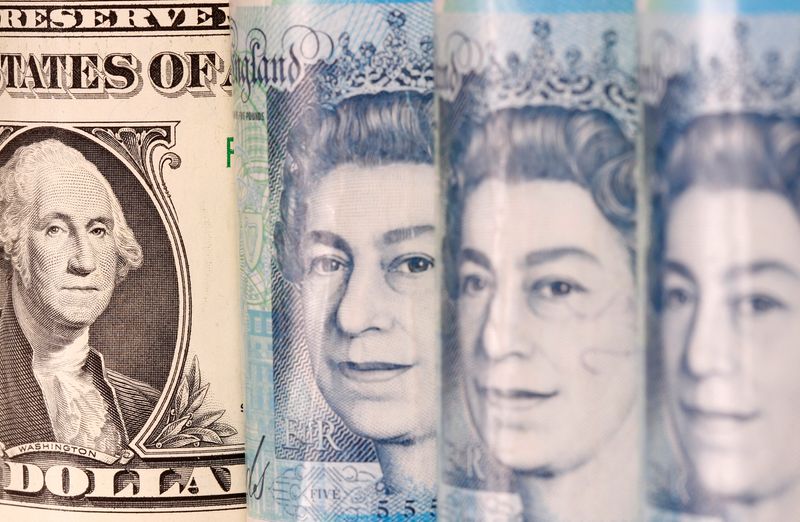By Sujata Rao
LONDON (Reuters) -Sterling firmed against the dollar on Monday and briefly hit 23-month highs against the euro at the start of a week where the Bank of England is expected to raise interest rates for the second time in as many months.
The currency benefited from the greenback's broad retreat but it gave up earlier strong gains against the euro, which jumped 0.6% on the day against the dollar.
The pound mostly shrugged off news that an inquiry by civil servant Sue Gray into lockdown parties at Prime Minister Boris Johnson's office and residence had condemned some of the behaviour in government as being "difficult to justify."
Johnson, facing the gravest threat to his premiership, apologised to parliament https://www.reuters.com/world/uk/im-sorry-uk-pm-johnson-says-after-lockdown-party-report-2022-01-31.
By 1600 GMT, the pound was up 0.2% versus the dollar at $1.3419 but eased 0.3% to the euro at 83.520 after hitting 83.05 pence, its highest level since mid-February 2020.
The British currency is set to end January with a loss against the dollar, which has benefited from the rapid ramping up of Fed rate hike bets.
Against the euro it is up 0.7% this month, partly erasing some earlier gains as markets also price euro zone interest rate hikes for end-2022.
Most economists polled by Reuters expect the BoE PREVIEW-Bank of England on track for second rate rise in under two monthsto raise rates to 0.5% on Feb. 3 from 0.25%. If the bank does that, it would also stop reinvesting maturing gilts and start to reduce its 875 billion-pound government bond holdings.
Craig Inches, portfolio manager at Royal London Asset Management, said markets might not be prepared for the possibility of a more hawkish BoE, especially as balance sheet shrinkage unleashes more bond supply.
"If they move interest rates to 0.5%, the market will expect them to announce they won't be reinvesting the proceeds of the March 2022 gilts .... that will be the first sign we see of how markets react to balance sheet reduction," Inches said.
He also said that while the market was pricing terminal rates - where rates may peak - of just above 1%, the effect of Brexit on labour costs could push that much higher.
Money markets are pricing rates at 1.25% by year-end.
HSBC highlighted risks the BoE would flag even higher inflation ahead, or signal actively cutting its balance sheet, rather than just allow maturing gilts to roll off.
"If the terminal rate were to be adjusted much higher, due to either of the above forces, it would provide more ammunition for rate hikes and would create a less negative backdrop for sterling," HSBC told clients.

Inflation risks could come from a 50% jump in energy bills from April and government reluctance to cut value-added tax on energy.
Several BoE policymakers have commented on inflation risks in recent weeks, with governor Andrew Bailey https://www.reuters.com/world/uk/boes-bailey-sees-risk-uk-inflation-pressures-will-linger-2022-01-19 suggesting the risk of second-round inflation effects was a source of concern and that the bank would do "everything we can do".